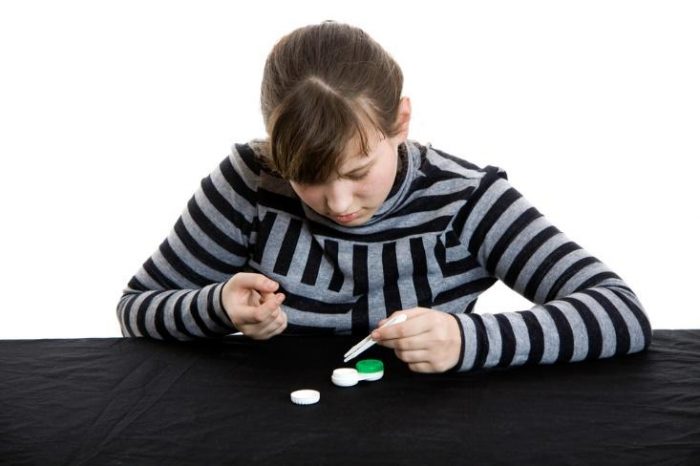If you’re an adult suffering from myopia or nearsightedness, then switching to contact lenses from eyeglasses is an obvious step. The advantages are plentiful since the second option enables you to be frame-free and perform many everyday tasks more easily.
But wearing disposable contact lenses, as you know, comes with certain responsibilities. So, before buying contact lenses for your child as well you should visit a clinic for a contact lens evaluation and ask yourself: would he or she be able to take proper care of the lenses and maintain a healthy routine?
- Understanding the Circumstances
It’s not so much about putting them on and taking them off—kids are often fiercer than we think. But the entire ritual, from placing them in their solution at night and not falling asleep beforehand, to replacing them with a new pair every day if they are disposable ones, can be a burden to a young kid.
On the other hand, when kids complain about having to wear glasses, the prospect of them befriending lenses doesn’t look that grim anymore. Most kids have a hard time accepting the doctor-prescribed glasses. And if they get pointed at or even laughed at in school, you can begin to understand why they are so hesitant toward wearing glasses.
What’s more, glasses may not only fail to make a child blend in, but they can downright get in his or her way. If your kid is playing any sports, be it baseball, basketball or any gymnastics, then frames cannot be part of the game. The glass can injure the eye if there is an accident or an unexpected fall. Not to mention, it does not help with the peripheral vision at all.
- The Kids Are Alright
One of the biggest concerns when it comes to Pure Optical contact lenses for children is you, the parent. If you decide to buy your little one contact lenses, then it’s a sign you trust them with a big responsibility. Kids like to know they are trusted and can’t wait for the opportunity to prove that they are reliable.
Sure, if your baby is too young, then she or he won’t be able to handle disposable lenses on their own. But if they are sufficiently grown, doing the whole put on/take off ritual can easily be managed single-handedly.
With over four million children under the age of 18 wearing contacts in America, the premises look hopeful indeed.
As a matter of fact, in a recent study conducted on almost 200 children, 71 percent with ages between 8 and 12 declared that they prefer wearing lenses instead of eyeglasses. Whereas in the case of teenagers in the group, the percent was as high as 78. The study also concluded one significant aspect which all the kids alluded to: contacts improve how they feel about their appearance and their participation in different social activities.
- The Issue of Age
If you do a bit of reading on the topic of wearing eyeglasses or contact lenses, it becomes evident that the debate cannot be solved with arguments about age. It is more about the child’s maturity and his or her capacity of being a responsible person that can give you an idea on whether he/she is capable of handling contact lenses.
If your child has good innate personal grooming habits, then he might be a suitable candidate. If he follows through on everyday chores easily, such like homework or cleaning up the room, that’s also a sign you can incline towards yes. Contact lenses represent a serious responsibility, so you should make sure your little one has the right motivation to practice good eye care.
When you know your child clearly understands the advantages of wearing lenses and is willing to move up to that stage, it’s time for you to support and assist him or her in the process. Because regardless of how responsible children prove to be, they still need to be instructed.
In conclusion, don’t let the problem be entirely up to them. Advise your child on how to properly disinfect lenses, when to replace an old pair and how it’s prohibited to share or swap their contact lenses with another child.
Last but not least, no matter how independent they can be, it’s still a good precaution to check on their healthy habits from time to time.
Find a Home-Based Business to Start-Up >>> Hundreds of Business Listings.

















































